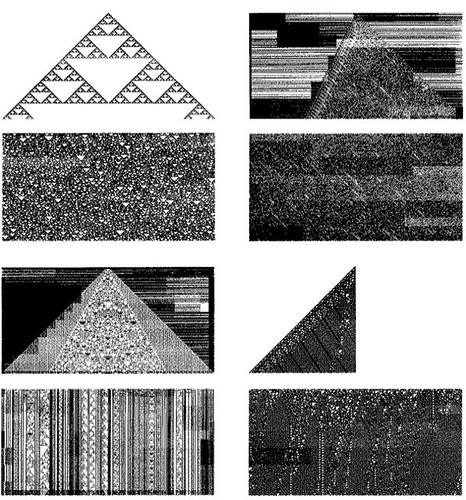Even with extremely simple rules, one can get extremely complicated behavior.
-Stephen Wolfram
Wouldn’t it be exciting, Stephen Wolfram wonders, to have a little computer program that could function as a precise, ultimate model of our universe? If you ran the program long enough, it would reproduce every single thing that happens. It’s not out of the question, according to Wolfram’s lecture which somehow encapsulates his 1,200-page opus, A New Kind of Science, in a single hour.
Thanks to the new release of MIT World (and ISITE Design, the Portland agency who created it), we can watch Steven Wolfram’s entire 1.5 hour lecture on the book. While I read the book when it first came out a few years ago, it is always great to be able to watch Steve speak about his ideas. As I read the book for the second time, his voice will help guide me through as I gain new intellectual perspectives.
Stephen Wolfram is a MacArthur Prize winner, and world-renowned for his work in scientific computing. He was educated at Eton and Oxford, and received his Ph.D. in theoretical physics from Caltech at the age of 20. His breakthrough work involved studying the behavior of simple computer programs called “cellular automata”. After a career at Caltech, the Institute for Advanced Study in Princeton, and at the University of Illinois, he launched Wolfram Research, Inc., publisher of Mathematica, the world’s most widely used symbolic mathematics software.
Wolfram’s vast and penetrating research uses simple computations to generate complex computer models that resemble designs found in nature. He embraces the really big subjects, and the really small ones—from patterns on mollusk shells and the shapes of leaves and snowflakes, to free will, evolution, and extra-terrestrial life.
This new kind of thinking might provide alternatives to evolution in explaining how different forms of life emerged. Wolfram believes his work is already transforming the study of science, as well as making possible a host of new technologies.



One Trackback
[...] Mathematician and Physicist Steven Wolfram found that, “essentially regardless of details, the results of iterated computations fall [...]